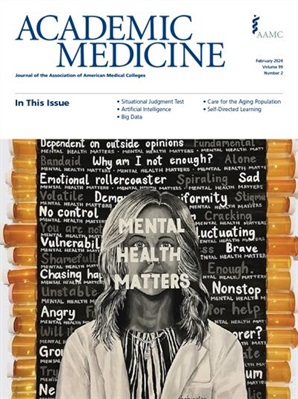Diversity and Inclusion Through Collaboration: Co-Producing a Simulation Curriculum to Address Discrimination Against Trainees.
IF 5.3
2区 教育学
Q1 EDUCATION, SCIENTIFIC DISCIPLINES
引用次数: 0
Abstract
Discrimination toward trainees is a pervasive problem, with surveys showing it is often perpetrated by patients. For several years, residents and faculty in an internal medicine residency have participated in a workshop offering a framework for responding to discriminatory behavior by patients. As part of a larger effort to reinforce this teaching and promote an inclusive environment, the authors pursued a multi-pronged simulation curriculum that could be incorporated into graduate medical education programs across their institution. First, the authors conducted trainee and faculty focus groups to better understand their experiences. Qualitative data was collected, including recommendations for responding to discrimination, characteristics of the most common experiences, and trainees' own ideas for worthwhile simulation scenarios. Trainees and faculty were then brought together in a collaborative process to co-develop simulation cases that were later implemented in curricula across multiple learner levels, specialties, and contexts. Participants in these simulations reported improved comfort in responding to discrimination in the moment and/or in the wake of such incidents. Through trainee-faculty collaboration, the project yielded authentic and impactful simulation experiences for learners, while also giving trainees an opportunity to turn previous trauma into constructive learning opportunities that promote an inclusive environment.通过合作实现多样性和包容性:共同制作模拟课程,消除对受训人员的歧视。
对受训者的歧视是一个普遍存在的问题,调查显示这种歧视往往是由患者实施的。几年来,一家内科住院医师培训机构的住院医师和教师参加了一个研讨会,该研讨会提供了一个应对患者歧视行为的框架。作为加强这一教学和促进包容性环境的更大努力的一部分,作者采用了一种多管齐下的模拟课程,可将其纳入整个机构的研究生医学教育计划中。首先,作者进行了学员和教师焦点小组讨论,以更好地了解他们的经验。收集到的定性数据包括应对歧视的建议、最常见经历的特点以及学员自己对值得模拟场景的想法。随后,学员和教职员工在合作过程中共同开发了模拟案例,这些案例随后被应用于多个学习水平、专业和环境的课程中。这些模拟案例的参与者表示,他们在应对歧视事件时和/或在此类事件发生后更加得心应手。通过学员与教师的合作,该项目为学员提供了真实而有影响力的模拟体验,同时也为学员提供了一个机会,将以前的创伤转化为促进包容性环境的建设性学习机会。
本文章由计算机程序翻译,如有差异,请以英文原文为准。
求助全文
约1分钟内获得全文
求助全文
来源期刊

Academic Medicine
医学-卫生保健
CiteScore
7.80
自引率
9.50%
发文量
982
审稿时长
3-6 weeks
期刊介绍:
Academic Medicine, the official peer-reviewed journal of the Association of American Medical Colleges, acts as an international forum for exchanging ideas, information, and strategies to address the significant challenges in academic medicine. The journal covers areas such as research, education, clinical care, community collaboration, and leadership, with a commitment to serving the public interest.
 求助内容:
求助内容: 应助结果提醒方式:
应助结果提醒方式:


